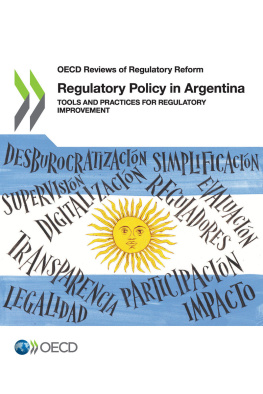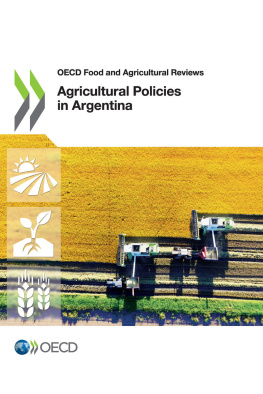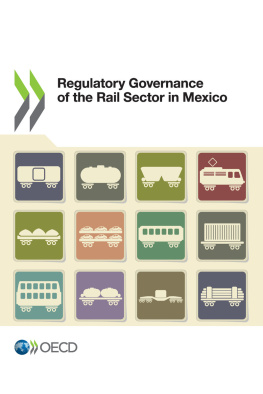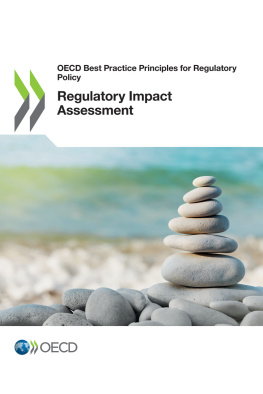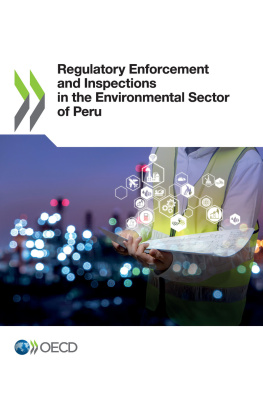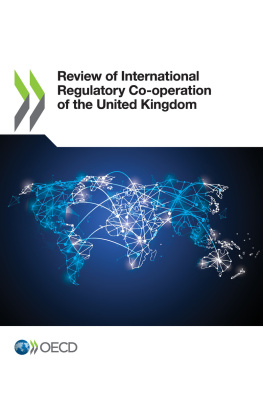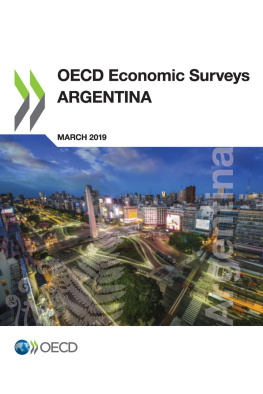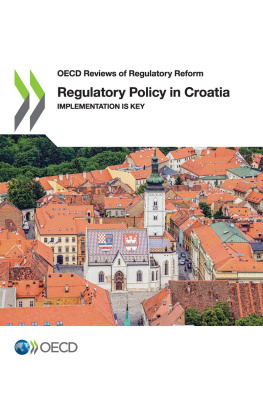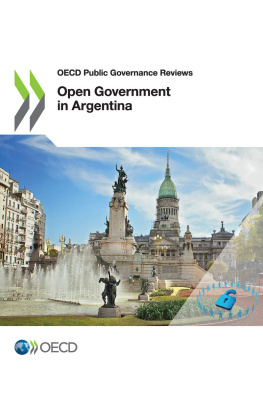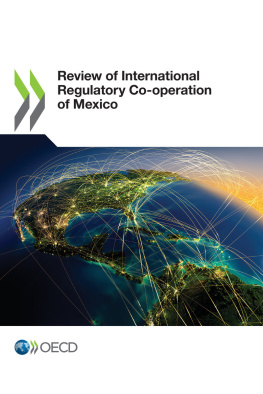OECD - Regulatory Policy in Argentina
Here you can read online OECD - Regulatory Policy in Argentina full text of the book (entire story) in english for free. Download pdf and epub, get meaning, cover and reviews about this ebook. year: 2019, publisher: OECD Publishing, genre: Politics. Description of the work, (preface) as well as reviews are available. Best literature library LitArk.com created for fans of good reading and offers a wide selection of genres:
Romance novel
Science fiction
Adventure
Detective
Science
History
Home and family
Prose
Art
Politics
Computer
Non-fiction
Religion
Business
Children
Humor
Choose a favorite category and find really read worthwhile books. Enjoy immersion in the world of imagination, feel the emotions of the characters or learn something new for yourself, make an fascinating discovery.
Regulatory Policy in Argentina: summary, description and annotation
We offer to read an annotation, description, summary or preface (depends on what the author of the book "Regulatory Policy in Argentina" wrote himself). If you haven't found the necessary information about the book — write in the comments, we will try to find it.
OECD: author's other books
Who wrote Regulatory Policy in Argentina? Find out the surname, the name of the author of the book and a list of all author's works by series.
Regulatory Policy in Argentina — read online for free the complete book (whole text) full work
Below is the text of the book, divided by pages. System saving the place of the last page read, allows you to conveniently read the book "Regulatory Policy in Argentina" online for free, without having to search again every time where you left off. Put a bookmark, and you can go to the page where you finished reading at any time.
Font size:
Interval:
Bookmark:
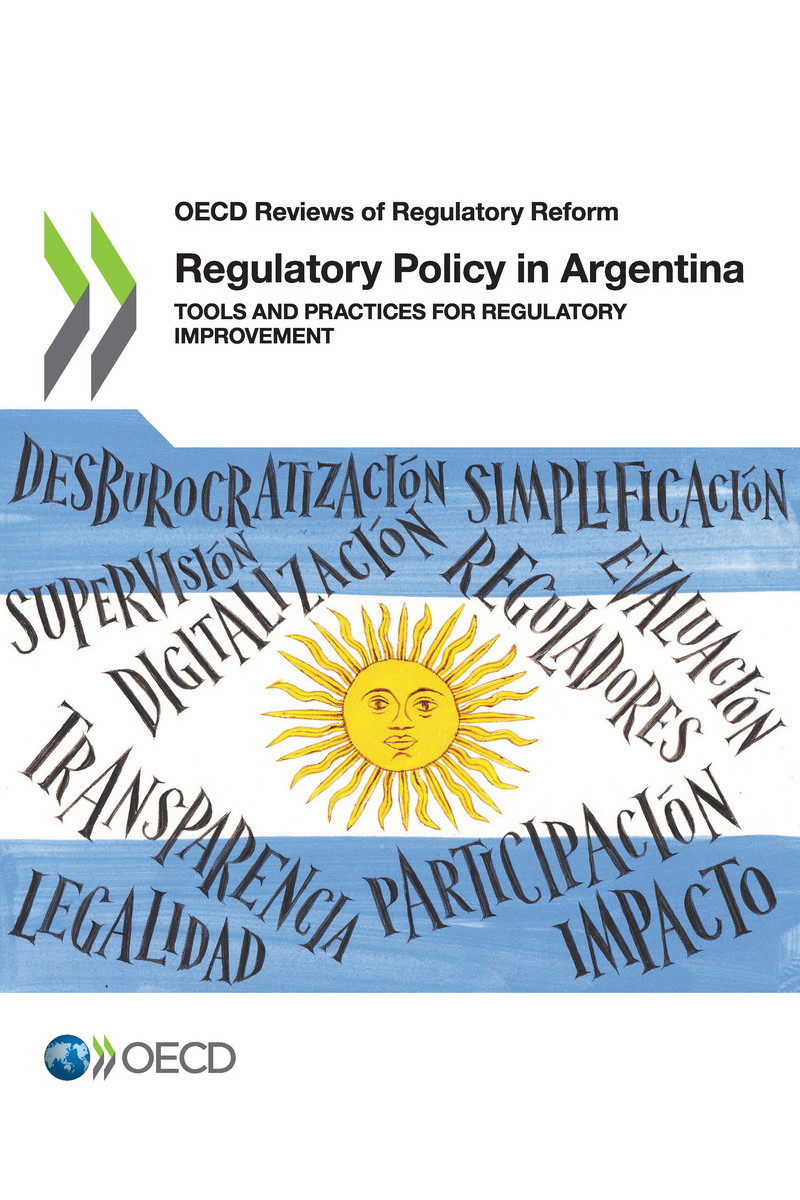
OECD (2019), Regulatory Policy in Argentina: Tools and Practices for Regulatory Improvement , OECD Reviews of Regulatory Reform, OECD Publishing, Paris.
https://doi.org/10.1787/d835e540-en
High-quality regulations should help governments meet policy objectives, such as protecting consumers and the environment, without becoming too burdensome for citizens and businesses. Argentina has embarked on a series of reforms to improve the quality of its regulatory framework. This has focused mainly on improving the current stock of regulation and government procedures and the more effective use of information and communication technologies.
The OECD Review of Regulatory Policy in Argentina presents information on the policies, institutions and tools used by the Argentinian government to design, implement and enforce regulations. The review provides policy recommendations to strengthen the governments capacity to manage regulatory policy.
The review finds that Argentina is putting in place the necessary framework for regulatory policy. It has published several legal instruments to promote the use of regulatory management tools, such as ex ante assessment of draft regulations and stakeholder engagement. For instance, Argentina issued guidance to ensure that draft rules meet legitimate policy objectives and that the potential benefits for society outweigh the costs. Argentina should now ensure that this tool is systematically used, including to incorporate the views of citizens and businesses in the rulemaking process. Argentina has also made great strides in moving towards a paperless government by digitising internal government procedures.
The review also finds that several government agencies in Argentina, including secretariats and ministries, share responsibility for supervising the use of tools and practices to promote good regulation. Argentina has recently established a regulatory policy group, bringing together the current agencies and offices with responsibilities for the promotion of regulatory quality. This is a welcome development, which should, in time, ensure greater co-ordination and effectiveness of regulatory policy.
The review methodology draws on two decades of peer learning reflected in the 2012 Recommendation of the OECD Council on Regulatory Policy and Governance , The recommendation identifies the measures that governments can and should take to support better regulation. These measures set a baseline for assessing regulatory management capacity in Argentina.
The OECD Regulatory Policy Committee leads the programme on regulatory governance with the support of the Regulatory Policy Division of the OECD Public Governance Directorate. Regulatory policy country reviews are a key part of the committees programme.
The country reviews on regulatory policy are co-ordinated by the Directorate of Public Governance, under the responsibility of Marcos Bonturi, and are carried out by the Regulatory Policy Division, headed by Nick Malyshev.
The work underlying this review was led by Manuel Gerardo Flores, Senior Economist, and by Andres Blancas, Economist. The following team members took primary responsibility for different sections of the review: Andres Blancas, Gloriana Madrigal and Manuel Gerardo Flores for context for regulatory policy and for policies and institutions; Delia Vazquez and Manuel Gerardo Flores for ex ante assessment of regulations; Gloriana Madrigal for administrative simplification; Andres Blancas for the governance of regulators; and Guillermo Morales and Andrea Perez for multilevel regulatory governance. Erik Perez provided research assistance. Adriana Garcia also contributed to the work. Marcos Bonturi, Nick Malyshev, Andrea Uhrhammer, Barbara Ubaldi and Arturo Rivera provided feedback to improve drafts of the report. Claudia Paupe lent administrative and organisation support. Jennifer Stein co-ordinated the editorial process.
The team included three peer reviewers from the members of the OECD Regulatory Policy Committee (RPC), who participated in the policy peer mission to Argentina and provided extensive input and feedback throughout the development of the review: Ruth Harries, Deputy Director, Better Regulation Executive, Department for Business, Energy and Industrial Strategy, United Kingdom; Wendy Liberante , Senior Policy Analyst, Office of Management and Budget, Office of Information and Regulatory Affairs, United States of America; and Hector Salas Camacho, at the time General Coordinator of Institutional Regulatory Improvement, National Regulatory Improvement Commission, Mexico.
The review is based on information collected through a questionnaire in January 2018. The review team also held meetings in Buenos Aires, Argentina, in February and April 2018, with a wide range of stakeholders, including government officials from several ministries and government agencies, representatives from the academia and business community, and experts in regulatory topics.
A draft of the review was discussed at the OECD Regulatory Policy Committee in November 2018. Thanks are extended to all members for their input and comments.
The report would not have been possible without the support of the government of Argentina. The OECD Secretariat is grateful to Pablo Clusellas, Legal and Technical Secretary of the Office of the President, Eduardo Martelli, Secretary for Administrative Modernisation, and Marcelo Scaglione, Undersecretary of the Ministry of Treasury. The team would like also to thank in particular Victoria Marco and her team, and Juan Ignacio Carranza for the unique assistance in collecting data and information, organising the OECD teams missions to Argentina and providing invaluable feedback and inputs at the different stages of the development of the review.
Font size:
Interval:
Bookmark:
Similar books «Regulatory Policy in Argentina»
Look at similar books to Regulatory Policy in Argentina. We have selected literature similar in name and meaning in the hope of providing readers with more options to find new, interesting, not yet read works.
Discussion, reviews of the book Regulatory Policy in Argentina and just readers' own opinions. Leave your comments, write what you think about the work, its meaning or the main characters. Specify what exactly you liked and what you didn't like, and why you think so.

